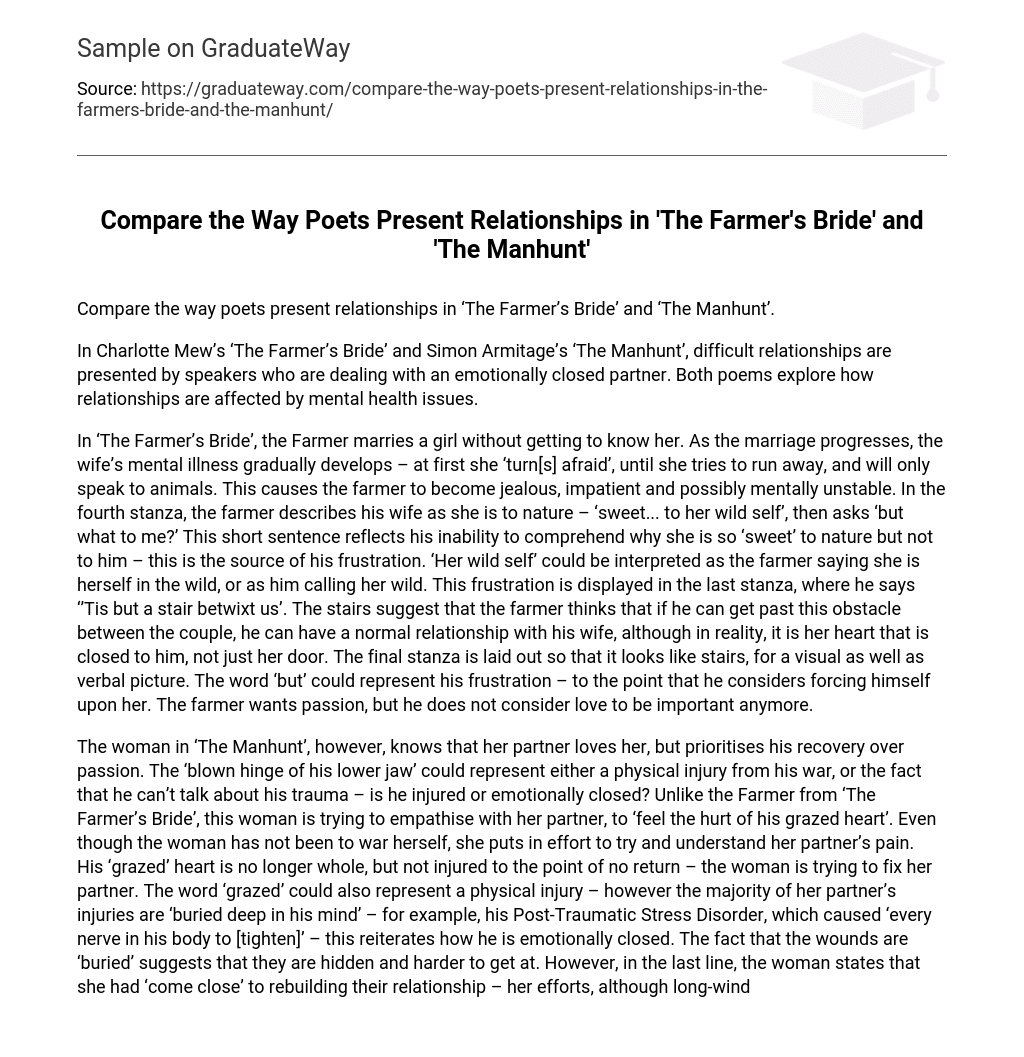Compare the way poets present relationships in ‘The Farmer’s Bride’ and ‘The Manhunt’.
In Charlotte Mew’s ‘The Farmer’s Bride’ and Simon Armitage’s ‘The Manhunt’, difficult relationships are presented by speakers who are dealing with an emotionally closed partner. Both poems explore how relationships are affected by mental health issues.
In ‘The Farmer’s Bride’, the Farmer marries a girl without getting to know her. As the marriage progresses, the wife’s mental illness gradually develops – at first she ‘turn[s] afraid’, until she tries to run away, and will only speak to animals. This causes the farmer to become jealous, impatient and possibly mentally unstable. In the fourth stanza, the farmer describes his wife as she is to nature – ‘sweet… to her wild self’, then asks ‘but what to me?’ This short sentence reflects his inability to comprehend why she is so ‘sweet’ to nature but not to him – this is the source of his frustration. ‘Her wild self’ could be interpreted as the farmer saying she is herself in the wild, or as him calling her wild. This frustration is displayed in the last stanza, where he says ‘’Tis but a stair betwixt us’. The stairs suggest that the farmer thinks that if he can get past this obstacle between the couple, he can have a normal relationship with his wife, although in reality, it is her heart that is closed to him, not just her door. The final stanza is laid out so that it looks like stairs, for a visual as well as verbal picture. The word ‘but’ could represent his frustration – to the point that he considers forcing himself upon her. The farmer wants passion, but he does not consider love to be important anymore.
The woman in ‘The Manhunt’, however, knows that her partner loves her, but prioritises his recovery over passion. The ‘blown hinge of his lower jaw’ could represent either a physical injury from his war, or the fact that he can’t talk about his trauma – is he injured or emotionally closed? Unlike the Farmer from ‘The Farmer’s Bride’, this woman is trying to empathise with her partner, to ‘feel the hurt of his grazed heart’. Even though the woman has not been to war herself, she puts in effort to try and understand her partner’s pain. His ‘grazed’ heart is no longer whole, but not injured to the point of no return – the woman is trying to fix her partner. The word ‘grazed’ could also represent a physical injury – however the majority of her partner’s injuries are ‘buried deep in his mind’ – for example, his Post-Traumatic Stress Disorder, which caused ‘every nerve in his body to [tighten]’ – this reiterates how he is emotionally closed. The fact that the wounds are ‘buried’ suggests that they are hidden and harder to get at. However, in the last line, the woman states that she had ‘come close’ to rebuilding their relationship – her efforts, although long-winded, are working.
Simon Armitage repeats the phrase ‘only then’ five times throughout ‘The Manhunt’. This emphasises how difficult it is to recover a relationship when your partner has changed – in this instance, due to Post-Traumatic Stress Disorder. He also juxtaposes the phrases ‘passionate nights’ and ‘intimate days’. This suggests that the love was not just physical but also emotional. The main technique Armitage uses, however, is imagery to suggest fragility. His collarbone is described as ‘damaged, porcelain’ and his punctured lung as ‘parachute silk’ – the ‘silk’ also suggesting luxury, and the ‘parachute’ representative of how he was injured in the army. In the tenth stanza, the bullet in his chest is described as a ‘foetus of metal’. The ‘foetus’ suggests delicateness. However, a foetus grows – perhaps this is symbolic of his mental illness? Armitage also uses enjambment, along with the lack of full stops, to make the injuries seem like an eternal litany.
Charlotte Mew also uses enjambment in the final stanza of her poem ‘The Farmer’s Bride’ to suggest a growing impatience. However, instead of using less punctuation, Mew increases the amount, to reflect the Farmer’s irrational state of mind, overcome by physical desire. Sibilance is used in the fourth stanza, to represent the town’s gossip – the repeated ‘s’ sound is emblematic of hushed whispers. The wife, on the other hand, does not speak – did Mew write her silence to be reflective of the fact that, at the time of writing, women had no voice in society? However, like an animal, she speaks with her eyes – or does her paranoid, possessive husband just assume this? Again, Mew may have used this to represent the fact that women at that
time were possessions to their husband.
In both ‘The Manhunt’ by Simon Armitage and ‘The Farmer’s Bride’ by Charlotte Mew, difficult relationships are presented whilst exploring mental illness, using techniques such as enjambment and symbolism.





